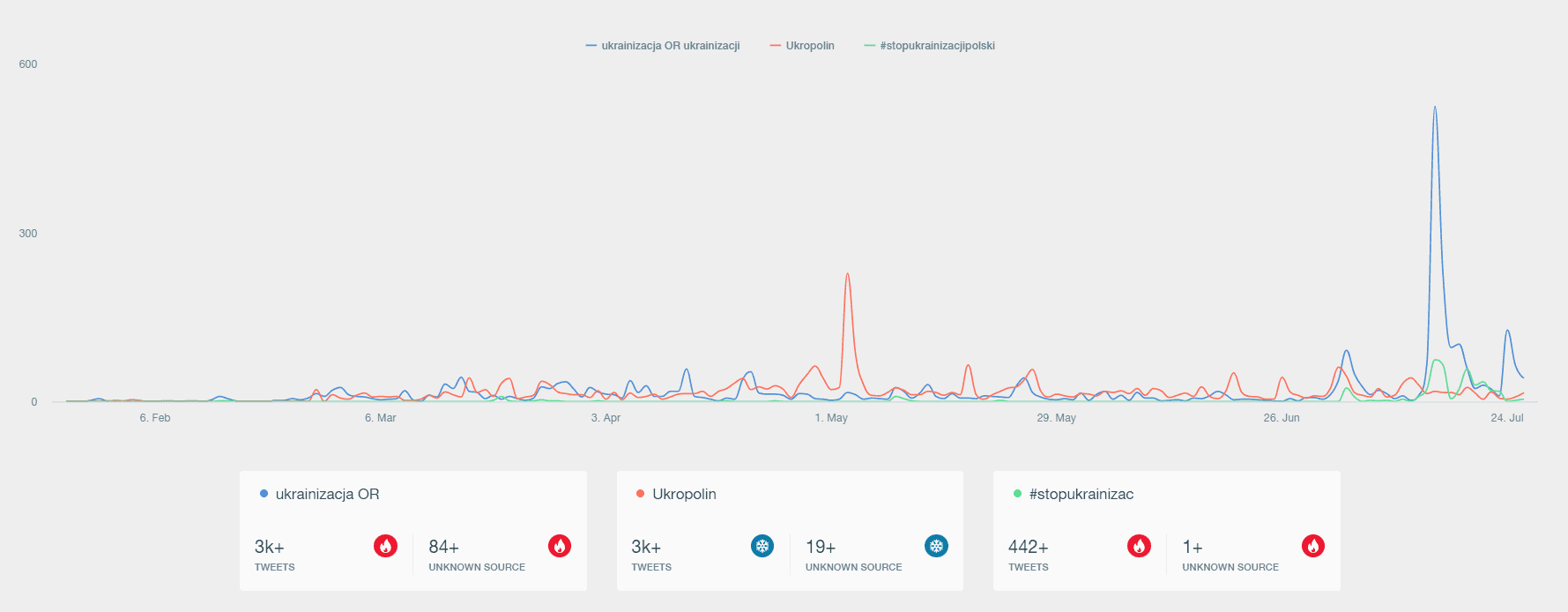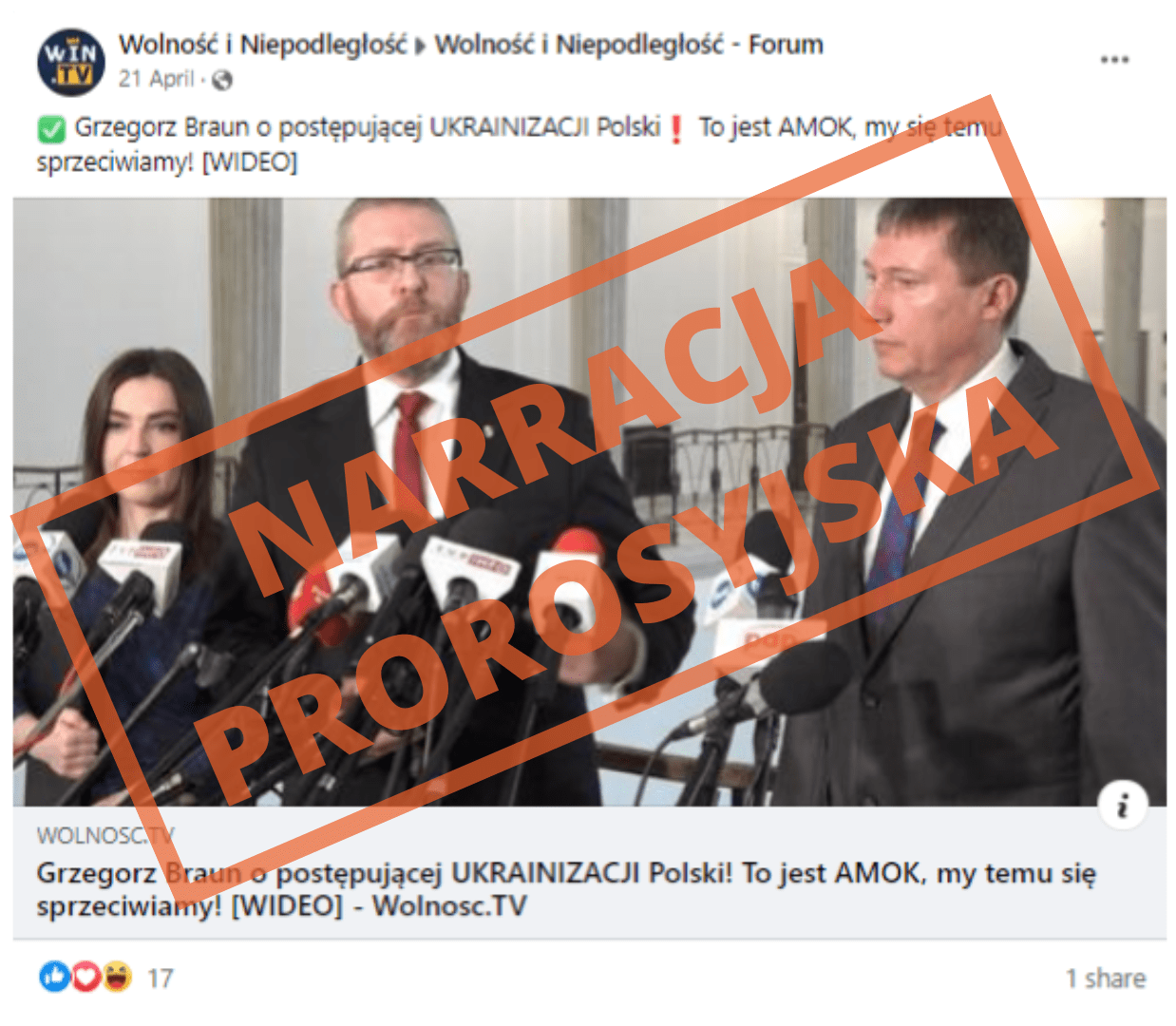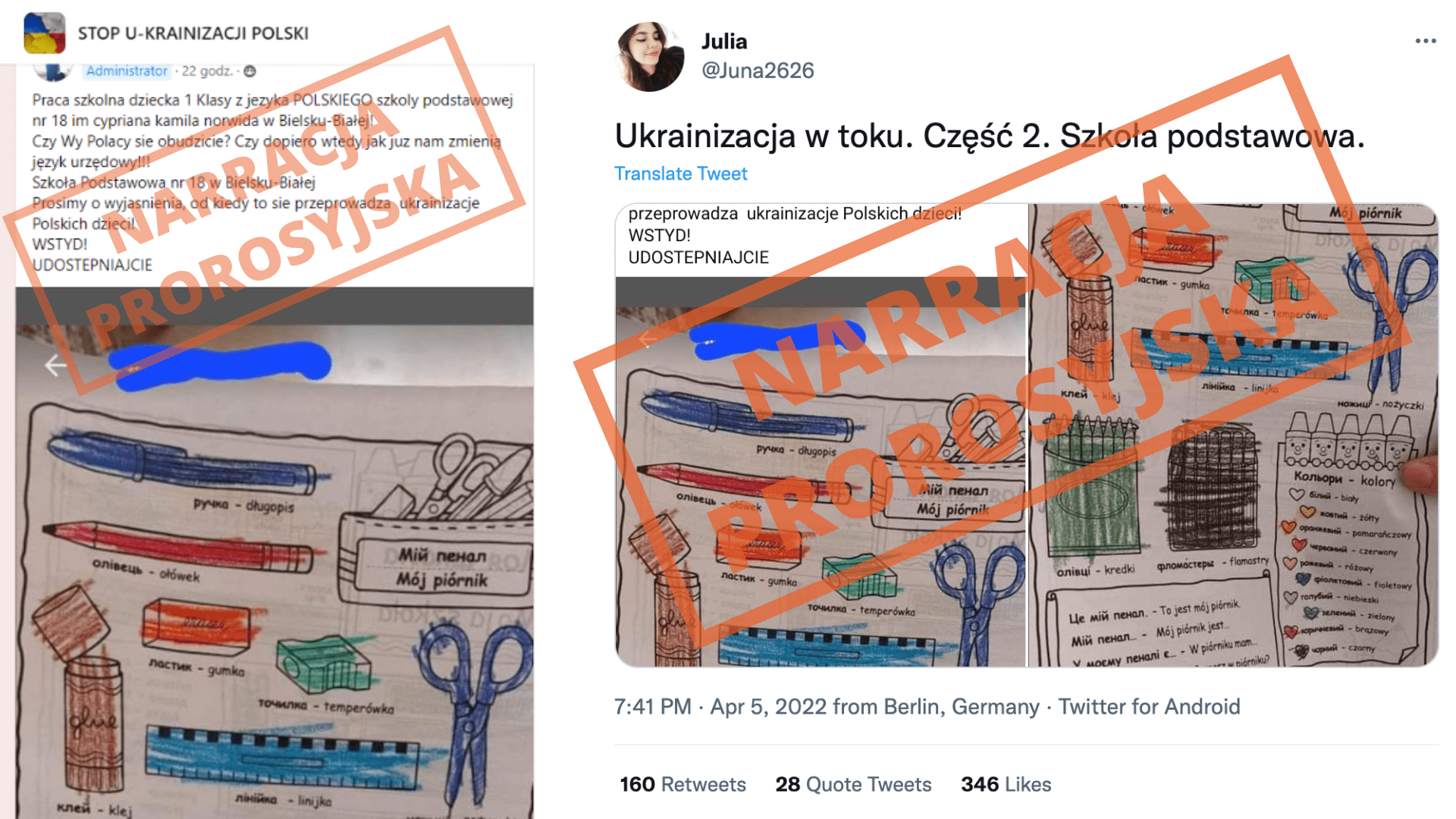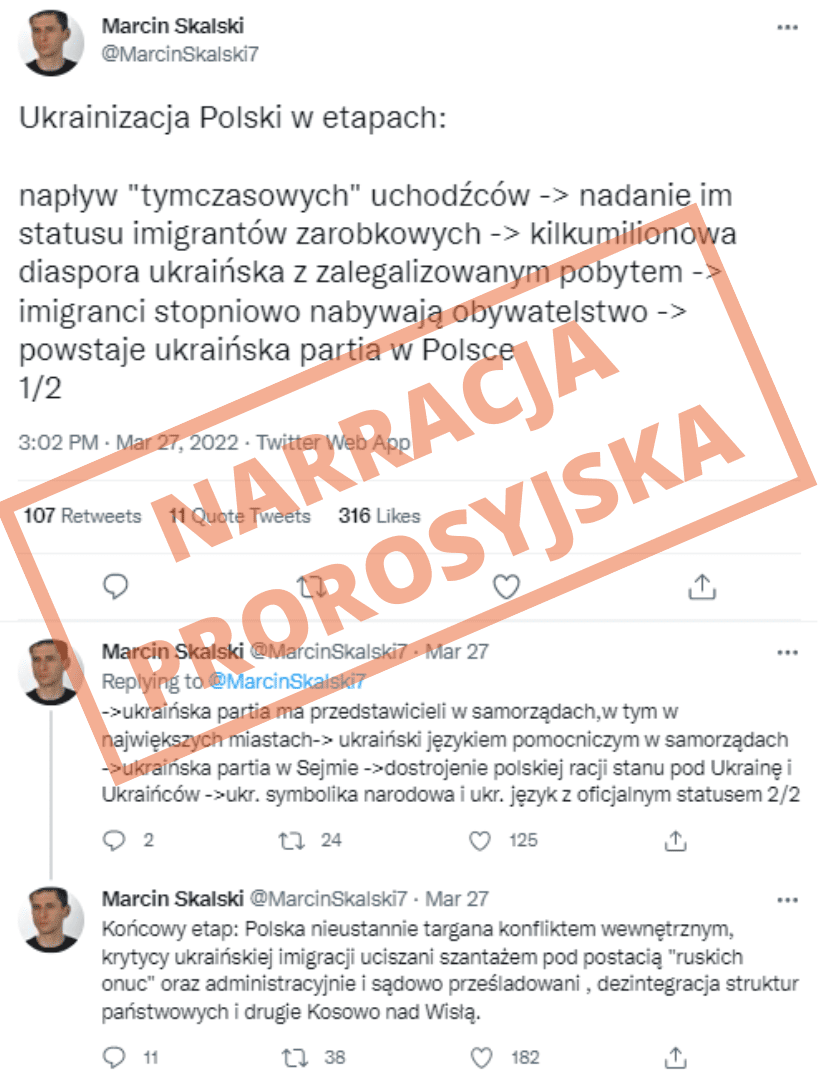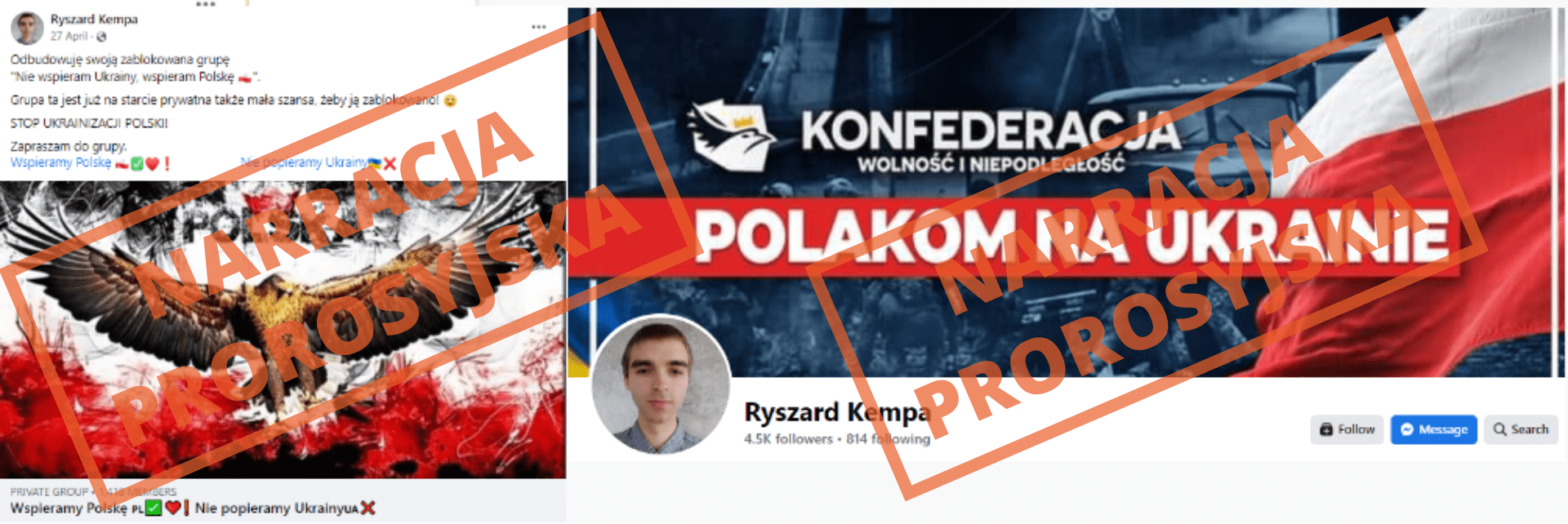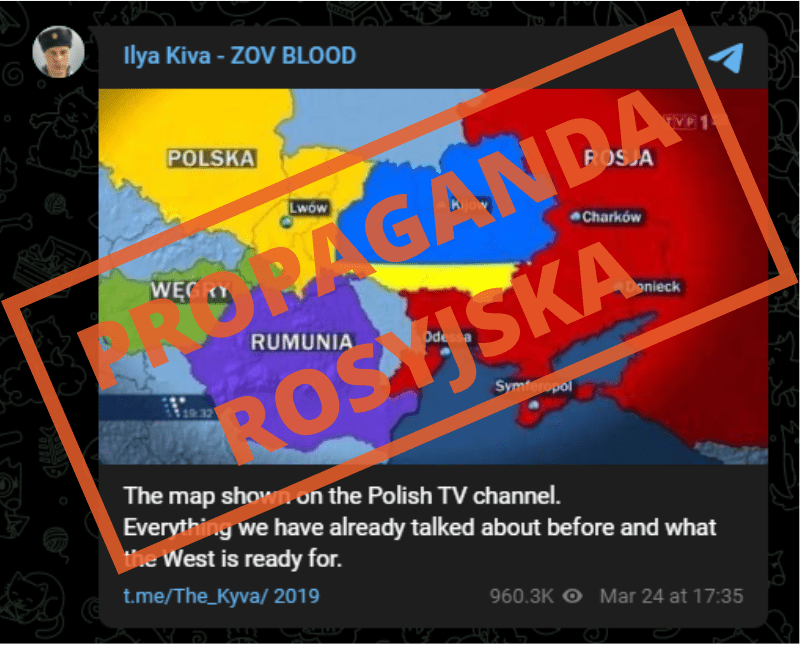Anna Gielewska (VSquare) 2022-08-07
Anna Gielewska (VSquare) 2022-08-07
Russian propaganda tries to frighten Poles with “Ukrainization” of their country. That catchphrase is being used and promoted by MP Grzegorz Braun and far-right influencers.
Similar narrative emerged simultaneously in other Eastern European countries.
The original, Polish version of this article can be found on FRONTSTORY.PL
On July 14, MP Grzegorz Braun announces his “Stop Ukrainization of Poland” programme, and almost immediately, main pro-Russian and anti-Ukrainian propagandists flood the Sejm. Even Mateusz Piskorski, a former Polish MP accused of spying for Russia and China, tries to participate in Braun’s parliamentary assembly meeting, but is stopped by the Marshal’s Guard at the very last moment.
Assembly room is full of alleged experts on “ukrainization”, including Marcin Skalski, former publicist of kresy.pl, now working for far-right wprawo.pl portal, who is fascinated by Russia’s rule in Donbas.
Skalski’s pro-Russian activities were covered by Marcin Rey, an authority on pro-Kremlin propaganda. Skalski was, among others, the originator of “Vilnius People’s Republic” website that insisted on “sending Polish little green men to Vilnius region and holding a referendum among its native people.”
In Sejm, Braun’s ideas are being discussed by Halszka Bielecka who has ties with Ordo Iuris and a conservative foundation called Academy of Patriots. Bielecka claims that Ukrainian teenage girls must be considered a threat to Polish kids, because one in four considers becoming a prostitute. The meeting is also attended by professor Bogusław Paź who publishes his texts in “Myśl Polska”, a weekly magazine that publishes Piskorski’s articles as well. In 2015, Paź posted online: “Banderite scum are taking a licking. Very nice! What’s not to love about Ruskies?” He was suspended by University of Wrocław but ultimately reinstated, when Wrocław’s prosecutor’s office discontinued the investigation.
Braun’s “Stop Ukrainization of Poland” pamphlet translates anti-ukrainian propaganda slogans into legal demands. For example, it explains how to stop the “change of our country’s ethnic structure” by abolishing the law that allows Ukrainians to apply for temporary residence permit (every foreigner has a right to receive a 3 year permit).
One day after Braun’s parliamentary team meeting, the Ukrainization topic reaches 5 million people on social media. We know that thanks to Brand24 company which gave access to their monitoring tools to people researching disinformation at the start of the Russia invasion of Ukraine.

The popularity of the keyword “Ukrainization” is on the rise after Braun announces the “Stop Ukrainization” project. Source: monitoring the keyword “Ukrainization” on Brand24
One of most influential accounts spreading anti-Ukrainian narratives and “Ukrainization” catchphrase belonged to Marcin Skalski.

Few days later, Braun’s pamphlet is being discussed on News Front channels (webpage and Telegram profile in English; access to Polish version was geoblocked by Polish authorities). News Front network is one of the pillars of Russian propaganda, and is regarded by many Western countries as an asset of Putin’s special services. The post is also shared by a pro-Russian account “Golos Mordora”, whose owner appeared as an expert in News Front shows.
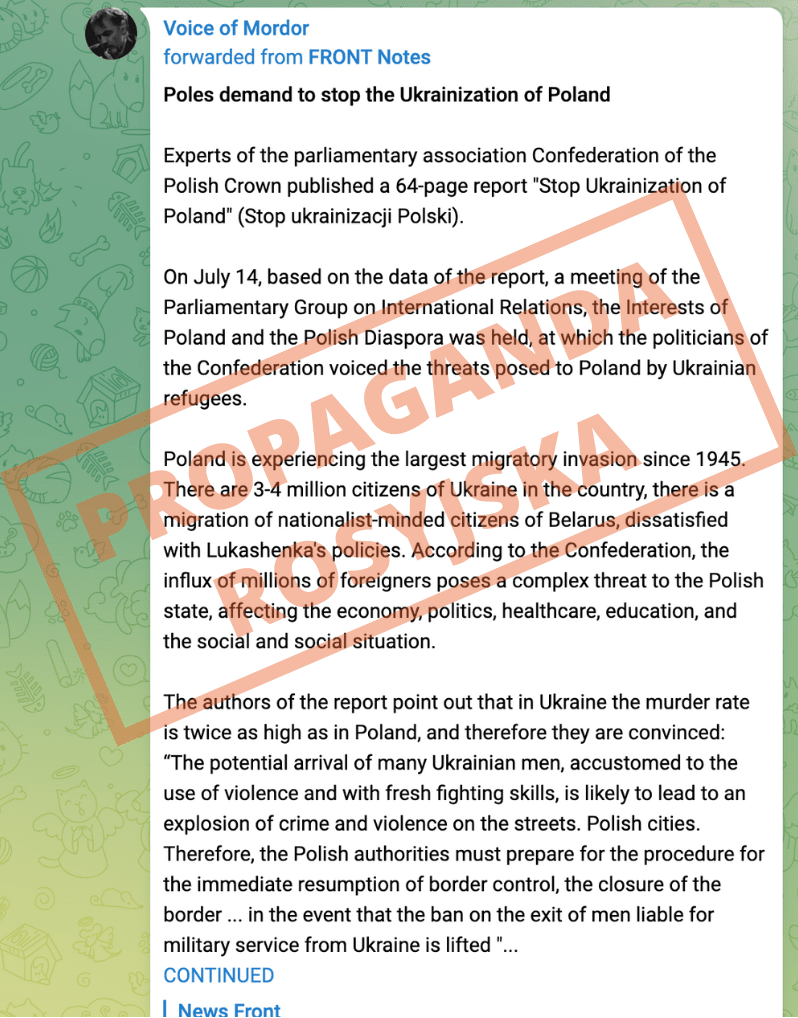
From USSR to far right
As Grzegorz Braun wants to protect Poles from Ukrainizition, Romanian right-wing influencer warns her people that Victor Orban is ukrainizing Romania. That is how Russian disinformation uses ethnic and border tensions between Ukraine and its neighbours to sow chaos in the region.
Along with researchers from Global Focus (Romania), Political Capital (Hungary) and European Western Balkans (Serbia), we analyse Russian disinformation after the start of Russia war in Ukraine. We monitor narratives that are common in those countries, as well as their regional variants. We examine roles played by far-right groups, organizations and networks in spreading narratives aligned with Russian propaganda goals. Our first report focuses on “ukrainization” narrative.
For many years, the term “Ukrainization” was known mainly to researchers of USSR history who used it to describe Soviet policies enforced in Ukraine in order to forcibly assimilate ethnic minorities (it was later replaced by a russification policy). It was also used with reference to actions taken by Ukrainian authorities during the WWII in Carpathian Ruthenia and Lviv. Russian propaganda dug it up in 2014, after the annexation of Crimea.
In May 2016, that term appeared in Polish online space (source: Crowdtangle), when Niezależny Dziennik Polityczny, one of the main channels distributing Kremlin’s disinformation, published a text titled “Islamization of the West, Ukrainization of Poland”. Soon, it spread through other channels circulating Russian propaganda (Dziennik Narodowy, Prawicowy Internet, Polish Sputnik).
Ukrainization term also appears is National Movement (Ruch Narodowy) campaigns. Since 2018, this far-right party has been protesting against the “Ukrainization of polish job market and polish cities.” In 2021, National Movement and Confederation (Konfederacja) started to complain about the “Ukrainization of universities.” During the covid-19 pandemic, anti-vaccination supporters and nationalists (e.g. Comrade Movement/Ruch Kamracki) claim that polish “police has been ukrainized.”
Ukrainization and Ukro-Poland narratives are traditionally present in Russian channels. “Poland is being transformed into Ukro-Poland with the help of Banderites’ descendants”, “[Ukrainian] immigrants turn Poland into two-national country”, “Poles are being forced to tolerate Bandera and Banderites”, “Tragedy of Volhynia leads to clashes with Ukrainians in Poland” – these are some of the headlines that has been appearing in polish version of RuBaltic portal (from Kaliningrad; currently not accessible in Poland) since 2019.
In an article from December 2019, Russian propagandist Sergei Shirokolobov muses about the creation of “Ukro-Poland.” He sees it as a conspiracy formed by globalists, Americans and big corporations, who failed to destroy traditional families through LGBT movement, and eradicate nation state with immigrants from Africa and Near East.
Shirokolobov anticipates that number of Polish citizens of Ukrainian descent will rise in the near future drastically. He warns Poles against giving Polish citizenship to Ukrainians and allowing them to form political parties, unless they want to worship Stepan Bandera. Shirikolobov also recaps selected texts published by Myśl Polska and weekly magazine “Do Rzeczy”, as well as speeches of Confederacy party members, for Russian readers.
Ukro-Poland or “Ukropolin” is a younger sister of “Judeo-Poland” – a conspiracy theory claiming that Jews plan to dominate Poles in order to create their own state in lieu of Poland. In the times of PRL (Polish People’s Republic), that theory was spread by security services until it was adopted by the far-right. Today, the far-right is replacing Jews, Muslims and LGBT with Ukrainians. Ukrainization narrative also alludes to a very popular conspiracy theory called The Great Replacement (about white Europeans being “replaced” by immigrants) – a plan concocted by deep state, elites, globalists and secret services.
Help as a form of treason and conspiracy
Between the outbreak of war and Braun’s “Stop Ukrainization of Poland” speech, that catchphrase has been gaining popularity. Today, it’s one of the most popular anti-Ukrainian narratives. It’s being popularised by Confederacy party members and sympathizers alike, as well as by far-right influencer Marcin Rola and his TV channel wRealu24, or by a former priest Jacek Międlar (a far-right extremist leader, convicted for hate speech against Jewish and Ukrainian people).
As early as January 2022, a network of fan pages connected with Międlar warns against the Ukrainization of Poland and posts links to articles published by wprawo.pl portal (Miedlar is its editor-in-chief).
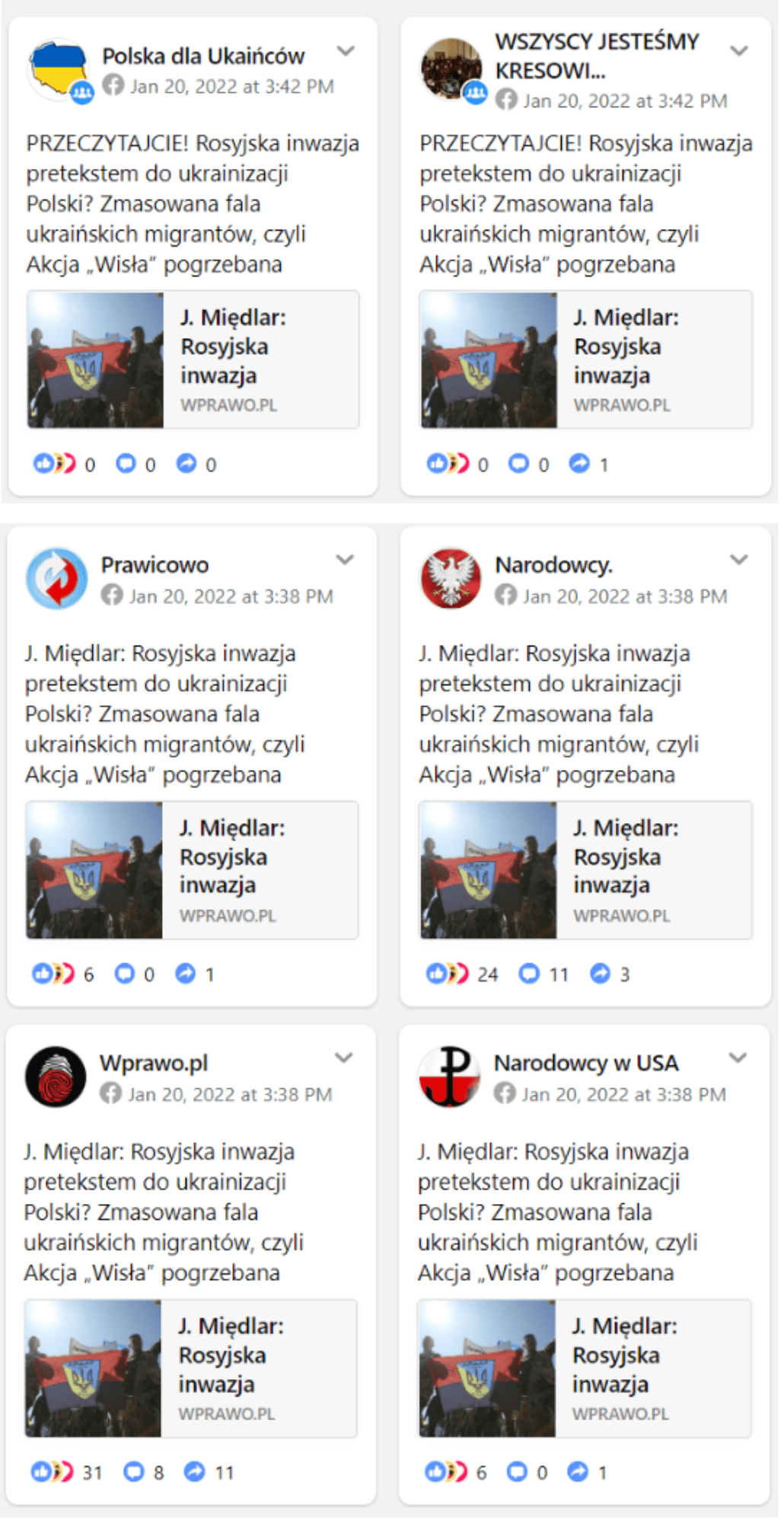
A few days before the Russian invasion of Ukraine, Grzegorz Braun calls the Warsaw-London-Kyiv alliance a “Polin-Banderland Pact.” During the first days of war, he protests against opening Polish borders for Ukrainian refugees. He also supports vigilante patrols that stalk people of un-European descent in Przemyśl. In an interview given to Myśl Polska on May 20, Braun argues that Poland is subjected to resettlement conducted on a mass scale. “Is it Ukro-Polin already?” he posts on Twitter when he sees Ukrainian flag in Polish Sejm.

Use of the keyword “Ukrainization” on Facebook. Source: Crowdtangle
References and mentions of Ukrainization rise in number drastically in the second month of war, as registered by Brand24 monitoring. Hashtag #stopukrainizacjipolski also appears in that period of time. In April, we wrote on FRONTSTORY.PL about the role played by online activities of Katarzyna Sokołowska (chairwoman of Fundacja Wołyń Pamiętamy/We Remember Volhynia foundation) and Jacek Międlar in spreading the UPA and Volhynia massacre themes in Polish social media. As EUvsDisinfo report pointed out, “trending “Volhynia massacre” on Polish Twitter has been initiated or at least assisted by Russian troll farms.”
In the following weeks, every act of solidarity with Ukraine is being dubbed as Ukrainization. False information, like the one that Polish kids will have to learn Ukrainian language, is spreading accross social media. TV channel wRealu24 hosts a debate on Ukrainization of Polish schools and invites teachers from Teachers for Freedom (Nauczyciele dla Wolności) association that groups anti-vaccination sympathizers. When Ukrainians receive a temporary identification number (PESEL), Russian propaganda sees it as another proof of on-going Ukrainization.
Ukrainization campaign following an anti-vaccination pattern
Hashtag #stopukrainizacjipolski is being promoted in social media by Braun, as well as other members and sympathizers of Confederation party.
Online campaign started by Braun and Confederacy follows a pattern used previously during anti-vaccination protests. Before members of Confederacy party submitted their “Stop Sanitary Segregation” bill in Sejm, Justyna Socha (Braun’s assistant and anti-vaccination leader) run a campaign using the very same slogan (borrowed from French anti-vaxxers).
Hashtag #stopsegregacjisanitarnej was used in Polish web for the first time by none other than Braun (when he formed his special parliamentary grouping). In this way, a member of Polish parliament is mainstreaming conspiracy theories from internet niches and introducing them into a public debate. He acts as a conveyor belt for Russian propaganda themes, hauling them from internet into mainstream media. In late July, Braun announced that he’s writing a book on war in Ukraine.
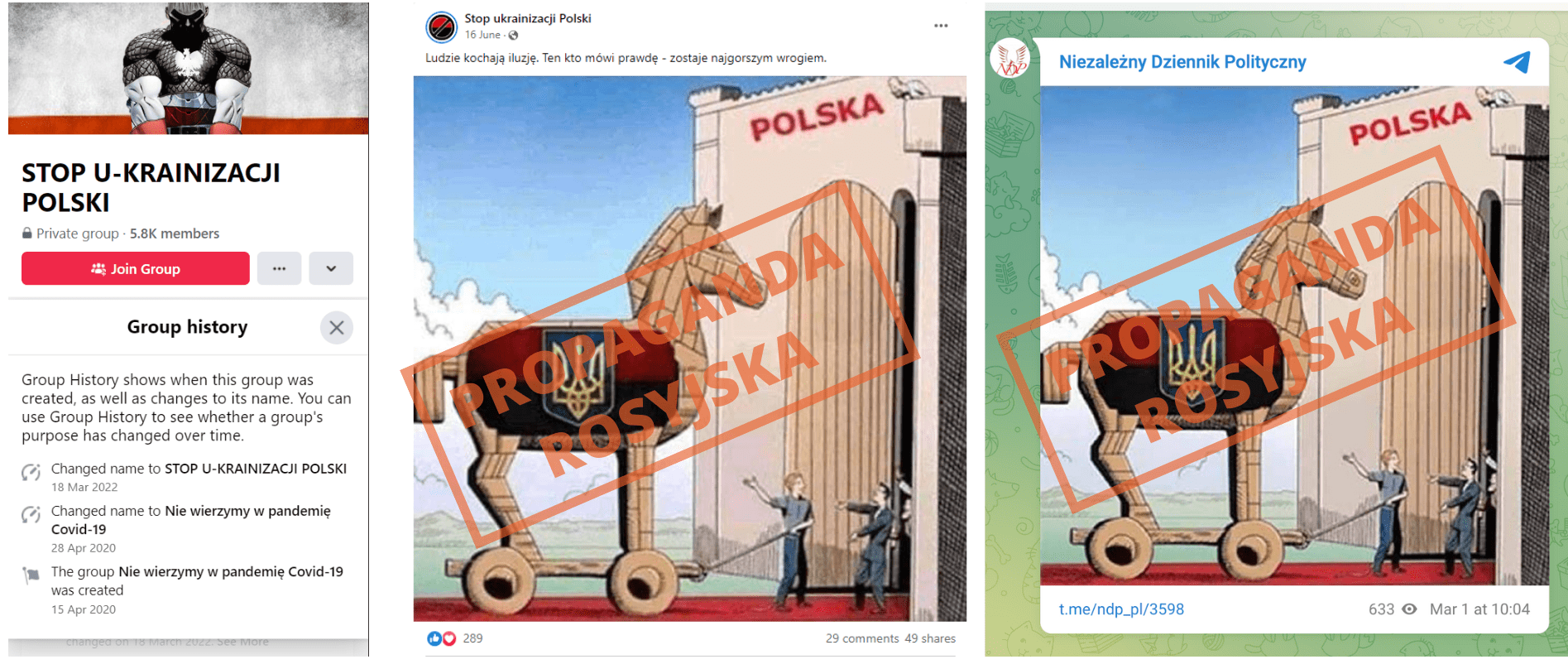
Examples of groups opposing “Ukrainization” that spring up on Polish FB. One previously gathered anti-vaccinationists. Another published propaganda graphics previously circulated by the Independent Political Journal.
What’s next for Europe?
In a world of Russian propaganda not only Ukrainians pose a threat to their neighbours. A mirror theory (we call it “reversed Ukrainization”) warns Ukrainians that Poland, Hungary and Romania are waiting for the collapse of Ukrainian state to annex its parts.
On March 24, Illia Kyva, a former member of Right Sector party who recently defected to Russia, posts a map on his Telegram account. It shows new territory of Ukraine, without Volhynia and Lviv which are part of Poland, and without Crimea, Odessa and the so-called People’s Republics, annexed by Russia. Ukrainian borders end on Dnieper.
History of that particular map shows how Kremlin’s propaganda machine works in the region. It was shown on Polish TV in 2015 to illustrate the provocation of Vladimir Zhyrinovsky, a pro-Putin radical and Deputy Chairman of the State Duma, who in 2014 asked Polish, Hungarian and Romanian authorities to partake in the partitioning of Ukraine. Although Polish Ministry of Foreign Affairs called this “open letter” preposterous, it didn’t stop Russian propaganda from using the incident for its own agenda. On the Russian internet the map was being shown as a “Polish proposal.”
Google search returns few dozen pages that replicated the map after 2015. Russian search engine Yandex shows hundreds of links.
Post of Russian collaborator (Kyva’s Telegram account is being followed by 82,000 people) gives the map a second life thanks to far-right media from Central-Eastern Europe. On March 25, Serbian and pro-Russian portal Intermagazin announces: “POLISH TV shows a map of Ukraine reduced to the vicinity of Kyiv, with half of the country controlled by Russia.”
On March 26, the topic is taken up by Romanian ActiveNews: “Romania wronged by the partition of Ukraine. Warsaw map returns Bucovina to Romania, but gives Maramures to Hungary and Bugeac to Russia.”
Similar texts can be found on other Romanian, Hungarian and Serbian far-right portals. The map is also shared in Ukrainian and Russian internet. It is even discussed by Turks and Greeks. According to SimilarWeb, conservative portals that discuss the map are among the 100 most read platforms in their respective regions.
This conspiracy theory surfaces even alongside news of president Zelenskyy’s proposing a bill to give Poles permits to reside and work in Ukraine. “Ukraine is handing part of its territory to Warsaw” disinformes Serbian Srbin.info portal. “It will be a unification format, an Ukro-Poland project” it adds, citing Russian political scientist Kira Sazanova.
This narrative supports official Kremlin propaganda. In late April, Sergey Naryshkin, director of Russia’s intelligence agency, proclaims that Poland and USA conspire to gain control over Western Ukraine. In late July, another “partition map” is posted by former president of Russia Dmitry Medvedev on his Telegram account.
Map’s history shows how pro-Kremlin propaganda is trying to disrupt relations between Ukraine and other Central European countries, and how it uses regional tensions between neighbouring countries, like Romania and Hungary.
In Romania, the term Ukrainization referred exclusively to alleged efforts of the Kyiv authorities to forcibly assimilate the Romanian minority in Bukovina. Now, it also refers to the planned secession of Romanian territories populated mainly by Hungarians who allegedly want to repeat what happened in Donbas. One of the most vocal promoters of Ukrainization theme is pro-Russian and far-right influencer Iosefina Pascal.
Similar narrative is present in Hungary, although without the use of the term “Ukrainization.” In the first weeks following Russia’s invasion of Ukraine, Hungarian far-right media tried to promote a message that dissolution or territorial disintegration of Ukraine is in fact a chance to return Trans-Carpathia back to its Hungarian fold.
In cooperation with: Anastasiia Morozova, Mariusz Sepioło
Cover photo: Grzegorz Braun during the celebration of the 400th anniversary of the victory at Chocim, Rzeszow, 25.09.2021. Source: Maciej Goclon / FotoNews / Forum
The report on “Ukrainization” in Poland, Romania, Hungary and Serbia is available here
A senior OSINT researcher and data analyst at FRONTSTORY.PL, Julia Dauksza has participated in many cross-border investigations. Previously, she collaborated with NGOs in Poland. She has been shortlisted for the Grand Press Award (2021, 2022). She was the recipient of the 2023 Bertha Challenge Fellow.
Anna Gielewska is co-founder and editor-in-chief of VSquare and co-founder of Polish investigative outlet FRONTSTORY.PL. She is also vice-chairwoman of Fundacja Reporterów (Reporters Foundation). A journalist specializing in investigating organized disinformation and propaganda, Gielewska was the John S. Knight Fellow at Stanford University (2019/20) and has been shortlisted for the Grand Press Award (2015, 2021, 2022) and the Daphne Caruana Galizia Award (2021, 2023). She was the recipient of the Novinarska Cena in 2022.







